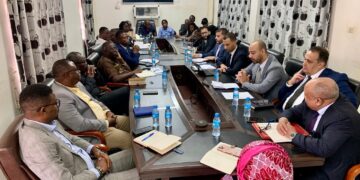Nigeria’s young people have heard promises for decades. They have witnessed countless empowerment drives that began with enthusiasm and ended in frustration. But over the past year, the Federal Ministry of Youth Development has sought to change that narrative by bringing structure and purpose to its programmes.
The Minister of Youth Development, Ayodele Olawande, maintains that empowerment should not be about distributing cash or souvenirs. He often says that genuine empowerment comes from building skills, supporting innovation, and protecting the dreams of young Nigerians.
After one year in office, the Ministry’s activities suggest a gradual shift from slogans to structured action.
Earlier this year, the Ministry launched a two-year strategic plan built around three pillars: Support, Empower, and Protect.
The idea is simple but ambitious — to train, mentor, and fund young people so that they can start businesses, find decent jobs, and remain safe in a rapidly changing world.
The Ministry’s strategy recognises the size of Nigeria’s youth population, with millions entering the labour market every year. Rather than rely on short-term grants, the plan aims to help young people develop practical and digital skills that align with the demands of today’s job market.
In December 2024, the Federal Government announced the Nigerian Youth Economic Engagement and De-Radicalisation Programme (NIYEEDEP). The initiative aims to create 20 million jobs over two years through agriculture, technology, renewable energy, and small-scale manufacturing.
Another project, the Youth Farmers’ Cooperative Scheme, is designed to engage millions of young people in agribusiness and food production, making agriculture more attractive to a generation often disheartened by unemployment.
To support these plans, the Ministry introduced a ₦120 billion training and skills fund. The scheme targets 60,000 young Nigerians for training in business, technology, and vocational work, with particular attention to internally displaced persons and other vulnerable groups.
Collaboration has been a major feature of Olawande’s first year. The Ministry has worked with organisations such as Junior Chamber International (JCI) Nigeria, The Guardian Newspapers, and the International Institute of Tropical Agriculture (IITA) to promote leadership, reorientation, and entrepreneurship.
Digital skills have also become a key focus. The Nigerian Youth Academy (NiYA), YouthCred, and Yo! Health are among the Ministry’s new platforms that combine training, finance, and well-being for young people.
At a recent Solana Stablecoins Africa Summit, Olawande told participants that Nigeria’s young people must move from being users of technology to becoming creators and regulators in the digital economy. He said the government’s goal is to make them globally competitive and self-reliant.
The Minister has also spoken frequently about reorienting values and encouraging dialogue among young Nigerians. Speaking at the National Youth Discourse Forum, he said that youth frustration often comes from love for the country, not hatred. His message is that protest alone is not enough; progress requires dialogue, creativity, and cooperation.
This idea of “protest to progress” has become a recurring theme in the Ministry’s activities, reflecting a growing effort to rebuild trust between young people and the government.
The Ministry’s initiatives have been well received, but results remain difficult to measure. Many of the projects are still in their early stages, and the impact on jobs or income has yet to be seen. Nigeria’s youth unemployment rate remains high, and experts say the main challenge is turning plans into tangible results.
Still, the Ministry now operates with a clearer framework than before. The combination of data, partnerships, and digital platforms gives it a better chance of achieving progress where others have failed.
As the Ministry enters its second year under Olawande’s leadership, expectations are high. The structure is taking shape, but young Nigerians are eager to see action that transforms their daily lives.
If the Ministry can move from planning to performance, it could help restore faith among a generation that has learnt to doubt government promises. For now, many young Nigerians are watching closely, hoping that this renewed focus on empowerment and innovation will finally lead to real opportunity — and lasting hope.
And, as The Guardian observed in an October editorial, Minister Olawande “has made young Nigerians begin to believe again.”



















































































 EduTimes Africa, a product of Education Times Africa, is a magazine publication that aims to lend its support to close the yawning gap in Africa's educational development.
EduTimes Africa, a product of Education Times Africa, is a magazine publication that aims to lend its support to close the yawning gap in Africa's educational development.